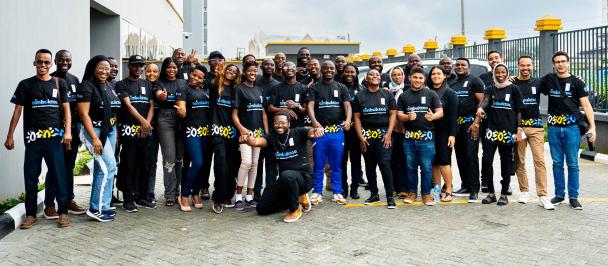UNDP Cote d'Ivoire
27 April 2021, Abidjan: The Economic Community of West African States (ECOWAS), in partnership with the UN Development Programme (UNDP), concluded a 3-part capacity building programme for women – led and owned businesses and trade associations on utilizing the preferences African Continental Free Trade Area (AfCFTA). The third and final workshop, held from 20 to 22 April in Abidjan, Côte d’Ivoire, targeted traders, producers and trade officials from French and Portuguese-speaking member states in the ECOWAS region.
The workshop series, titled "Maximizing the AfCFTA for SMEs, Traders and Trade Associations", commenced with a training of trainers in Freetown, Sierra Leone, followed by a workshop in Accra, Ghana for traders and officials from ECOWAS’ English-speaking member states. More than 100 participants from all 15 ECOWAS member states took part in the three workshops, including traders and producers in the agriculture/agro-processing, textile/fashion, and other value chains, as well as representatives of trade promotion agencies and customs.
Over the course of three days in Abidjan, participants learned about the provisions and implications of the AfCFTA, which will create an African market for goods and services, bring together 1.3 billion people, create a combined GDP estimated at $3 billion, and build on the progress already made in supporting integration within regional economic communities such as ECOWAS. Additionally, the operational tools of the AfCFTA, including the African Trade Observatory, the Non-Tariff Barriers Reporting mechanism and the Pan-African Payments and Settlements Platform were demonstrated.
A key outcome of the capacity building programme was to enhance the capacity of women exporters to take advantage of the emerging opportunities that the AfCFTA provides at both country and regional levels. Peer learning, e-learning and cross-regional dialogues with representatives of trade and business associations and governments in East, South and Central Africa, were incorporated into the programme to foster tangible connections for trade. As a result, some traders are already exploring business opportunities in other regions.
The in-depth discussions among participants also examined the challenges faced by entrepreneurs in exporting their products to other countries. Limited access to finance, poor infrastructure and excessive fees were listed as major obstacles to growing and operating their businesses. The participants identified practical and concrete next steps for governments, businesses and trade associations in order to take advantage of market opportunities within the AfCFTA framework.
High-level panellists at the opening ceremony were unanimous on the relevance of the capacity building programme, which is essential to respond to a global economy that is increasingly open, dynamic and complex.
Mr. Kaladji Fadiga, Director of Foreign Trade, representing the Minister of Trade and Industry of Cote d’Ivoire, thanked ECOWAS and UNDP for this initiative and assured that Côte d'Ivoire, which has already ratified the AfCFTA agreement, is doing its utmost to promote this important instrument through sensitization and training of various actors, particularly the private sector.
In his remarks, Mr. Tei Konzi, ECOWAS Commissioner for Trade, Customs and Free Movement, said “Small and Medium Enterprises, especially those led by women, represent a significant proportion of the workforce and play an essential role in trade. The ECOWAS Commission has undertaken many efforts to improve the general environment for women, including through the establishment of the ECOWAS Gender Development Center (EGDC) in 2003, the ECOWAS Gender Policy, the ECOWAS Gender and Trade Action Plan, and the additional act on equal rights between women and men – all instruments developed and implemented within the Community”.
Mr. Ousseini Diallo, Executive Secretary of the Federation of West African Employers’ Associations (FOPAO), noted the importance of the workshop for women entrepreneurs who, “in the West African region, manage the majority of SMEs and work in the sector of local trade.”
For UNDP Resident Representative, Ms. Carol Flore-Smereczniak, "The AfCFTA offers opportunities to radically transform the course of Africa's development and address the challenges faced by women. This is why UNDP's focus, as concerns the AfCFTA, is to make the agreement a catalyst for the development of women and youth, two groups that have significant potential to drive the transformation of African economies."
The AfCFTA is an initiative that aims at the liberalization of trade in goods and services, removal of non-tariff barriers, and coverage of Investment, Competition Policy, Intellectual Property Rights and E-commerce between AU State Parties. Its implementation requires that national governments and business owners are able to fulfill trade requirements to adequately prepare and position their countries to take advantage of the AfCFTA.
The three workshops were organized in partnership with the African Union, the European Union, the United Nations Economic Commission for Africa, the International Trade Centre, Afrexim Bank and the German Development Cooperation (GIZ).
***
About ECOWAS
The Economic Community of West African States (ECOWAS) was established on 28 May 1975 by the Treaty of Lagos. ECOWAS is a regional grouping of 15 members whose mandate is to promote economic integration in all areas of activity of its member states. Considered one of the pillars of the African Economic Community, ECOWAS was established to foster economic integration by creating a region without borders where people have access to its abundant resources within a sustainable environment and to promote good governance and democracy. For more information, visit www.ecowas.int.
About UNDP
UNDP supports the implementation of the AfCFTA at the national, regional and continental levels. This includes direct assistance to countries, capacity building for small and medium-sized enterprises, promoting linkages between SMEs in different regions, research, and support for the development of trade-enabling technologies through the establishment of accelerator labs. In 2020, UNDP published The Future of the AfCFTA - Serving Women and Youth, a report that gives voice to producers, traders and policymakers on the critical importance of small and medium enterprises in boosting intra-African trade.
For media inquiries, please contact:
- Monka Sandra Oulate, ECOWAS Director of Communication soulate@ecowas.int
- Michelle Mendi Muita, Communications Specialist, UNDP Regional Programme michellemendi.muita@undp.org
- Youssouf Diarra, Communication Specialist, UNDP Cote d'Ivoire youssouf.diarra@undp.org
Follow us on Twitter: @UNDPAfrica | @ecowas_cedeao
View photos from the workshops:
Hashtag: #OneAfricanMarket

 Locations
Locations




